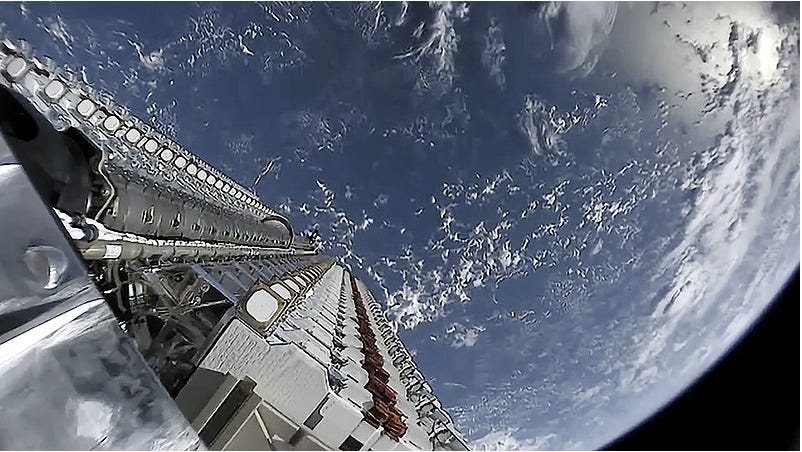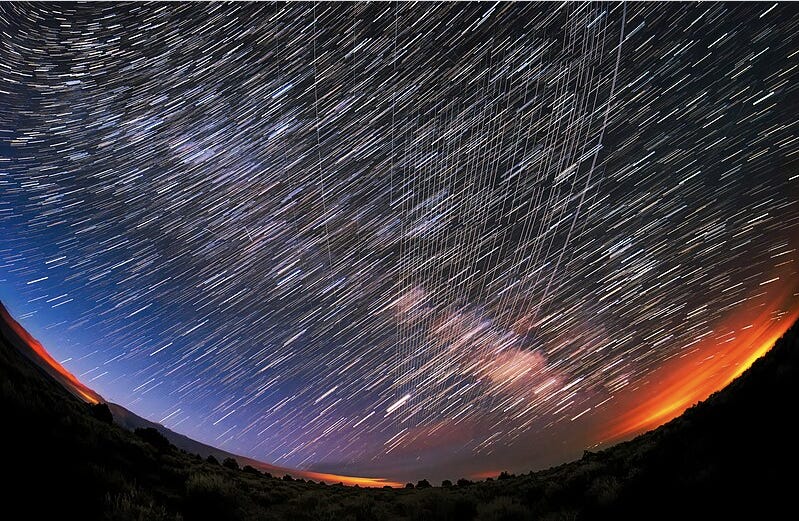What Would Captain Kirk Say If Starlink Interfered With The Prime Directive?
Image attribution: NBC Television, Public domain, via Wikimedia Commons
by Sarah Aminoff of Safe Tech International
What would Captain James T. Kirk, the fictional 23rd century character in Star Trek, say about so many Satellites’ launches punching holes in the ozone layer, satellite collisions and light pollution? Kirk serves in the fictional Starfleet, a space force maintained by the interstellar government United Federation of Planets.
In our present day, we have a Federation of Scientists who warn about averting environmental risks in the new space age, they believe we face an existential crisis created by the launch of so many new ‘mega constellations’ of thousands of satellites in the part of space near Earth called ‘Low Earth Orbit’ (LEO).
What would Captain Kirk say? Even if we were a civilization capable of space travel, would we even be considered for ‘United Federation of Planet’ membership if we couldn’t even safeguard our planet?
60 Starlink v0.9 satellites stacked together before deployment on 24 May 2019
Attribution: Official SpaceX Photos, CC0, via Wikimedia Commons
Interstellar governments (fictional or otherwise) may not want unfettered and unregulated commercial pollution for Starlink. We may violate the prime directive which states non-interference for other worlds: if we can’t control our own satellite pollution, there is no guarantee we may have discretion on other planets.
If there even was a present day Starfleet, would a Galactic Federation rescue us and interfere with our potential destruction of our magnetosphere from all the satellite launches? “The Prime Directive prohibits Starfleet personnel from interfering with the natural development of a society for good or bad, and that has often meant that crews must stand by as an entire civilization is wiped away by natural disasters or technological folly.” according to Screen Rant.
There may be no Galactic Federation to save the day, let alone UFOs, if we have too many rocket launches.
Real life facts: International Astronomical Union has a conference on light pollution and radio interference caused by satellites: https://astrobites.org/2024/10/01/iau-dark-and-quiet-skies//
The United Nations recognizes light pollution as detrimental (https://www.un.org/e…migratory-birds).
Timelapse of recently deployed satellites (vertical lines)
M. Lewinsky/Creative Commons Attribution 2.0, CC BY 4.0, via Wikimedia Common
International Astronomical Union (IAU-CPS), a worldwide institution focuses on mitigation of sky glow from satellites.
“Protecting the Sky is the Core Mission of the IAU because without the sky, there is no science of astronomy.” – IAU
Do We Need to Worry More About Rocket Emissions Than Airplanes?
Unlike airplanes, rocket emissions from space affect every layer of the atmosphere with toxins and aren’t washed away according to Scientific American. “Jet engines…burn very clean compared with rocket engines. Some types of hydrocarbon-fueled rocket engines emit hundreds of times more soot for each kilogram of fuel burned than do their jet engine cousins. And jets only occasionally fly in the stratosphere; rockets fly there every launch.”
Is Starlink Bridging the Digital Divide?
Starlink was denied 900 billion dollar broadband subsidies by the FCC for failing to meet its criteria of providing cheap internet to rural poor, according to Forbes.
“Gene Roddenberry always wanted Star Trek to depict a future of humanity without war, without hunger, without disease and without poverty: When she asks how much the ship has cost, Picard tells Lily: “The economics of the future is somewhat different. You see, money doesn’t exist in the 24th century… The acquisition of wealth is no longer the driving force in our lives. We work to better ourselves and the rest of humanity.” (‘Star Trek: First Contact’); see this fascinating blog.
Is Starlink embracing the Star Trek vision to eliminate poverty? Starlink did provide Hurricane Helene internet relief, and yet “The FCC previously found that Starlink had trouble meeting basic upload and download speeds and that rural subscribers would have had to pay an upfront fee of $600 at the time for a dish,” according to the New York Times.
“Although hundreds of free Starlinks were donated to North Carolina after Hurricane Helene…the free internet service is temporary. On the company’s website, Starlink said it would provide 30 days of service for the devices in affected areas, before a standard residential subscription would be charged.”
Space Junk May Prevent Us From Belonging To A Future Galactic Federation?
Although SpaceX has a distinct incentive to make sure any faulty Starlink satellites don’t end up in the future path of its own rockets and spacecraft, Starlink satellites are expected to come into the atmosphere to eventually burn up starting five or six years after they are launched and deployed, according to BCSatelllite.net, which states:
“Everything going into space must pass through the region that is largely inhabited by Starlink. What are the implications of the Starlink constellation on space junk at this critical altitude at which they operate? As it turns out the situation does not look good. Currently most space junk is located in between the Starlink and OneWeb altitudes.”
SpaceX Debris Lands on a Farm in Australia!
The International Astronomical Union Urges Action In Its first paper: https://www.iau.org/news/announcements/detail/ann24008/

If you want to hold ‘Space, the final frontier,’ sacred we need your help! One small step for all, one giant leap for all lifekind starts with a US Public Interest Research Group (US PIRG) grassroots petition:
Tell the FCC: Satellite mega-constellations need environmental review. We’re in a short window of time when we can prevent making a mess of space and our atmosphere – US PIRG
Please feel free to share the petition with anyone you think might be interested!





